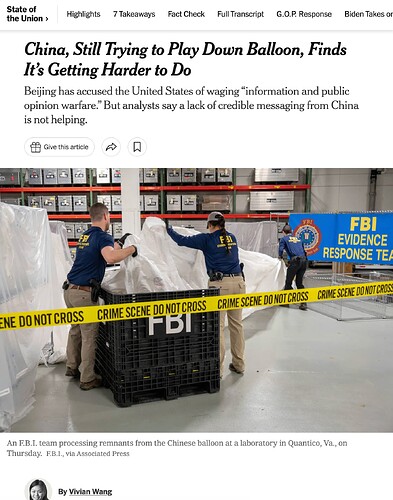-
美国指责中国有一个广泛的监视计划,而中国则试图淡化这一计划。
-
中国现在开始采取更加对抗的语气,并指责美国 “纯粹的政治操纵”。
-
美国国防部负责中国问题的官员德鲁-汤普森认为,中国试图尽量减少影响的做法已经不起作用了。
-
由于中国的信息传递不一致和缺乏可信的声明,气球事件已成为一个讨论的话题。
-
北京方面表示忏悔,并发表了遗憾的言论,但这一事件还没有淡化。
-
北京模糊地将气球归咎于一家不知名的民用公司,并声称其偏离轨道是一个孤立的错误,这在华盛顿引起了一定程度的不安。
-
与 "战狼 "的粗暴风格相比,中国一直在努力使其外交语气更加温和。
-
北京专注于国内问题,尽量减少世界舞台上的冲突,但气球事件还没有消退。
-
拜登政府说这艘船对美国人不构成威胁。
-
国务院详细说明了其观点,即该气球是由中国军方指挥的全球监视舰队的一部分。
-
拜登总统在国情咨文中承诺要抵御中国对美国主权的威胁,并宣称很少有世界领导人会羡慕习近平先生。
-
中国进行了反击,国家媒体抨击拜登的演讲,中国外交部发言人称拜登对习近平先生的评论是 “非常不负责任的”,“违反了基本的外交礼仪”。
-
毛宁女士指责美国在气球事件上的夸大和虚伪。
-
中国国防部拒绝了美国同行的电话建议。
-
中国驻法国大使表示,布林肯先生访问中国是不合适的。
-
中国的政治评论家们坚持认为美国是紧张局势的推动者,但也采取了鹰派的口吻。
-
上海复旦大学国际关系学教授沈逸认为,中美关系很难回到积极的轨道,而美国对此负有主要责任。他认为,最近的热气球事件显示了美国的真实面目。
-
尽管《环球时报》攻击拜登总统的国情咨文,但中国商务部对美国财政部长珍妮特-耶伦的访问表示欢迎。
-
《环球时报》还发表了一篇评论文章,强调了中美经济相互依存的重要性,以保持两国的积极关系。
-
洛伊国际政策研究所的东亚高级研究员理查德-麦格雷戈说,由于美国对中国的崛起感到焦虑,任何明确的升级行动都可能来自美国。中国目前致力于新的外交方向,但随着来自美国的报告的继续,中国可能会面临严厉回应的更大压力。
-
前美国外交官、卡内基国际和平基金会的学者道格拉斯-H-帕尔建议,中国应该在事件开始积累之前开始做出更多反应。他认为,这对双方来说都是明智的,有助于防止进一步的紧张局势。
-
由于美国对中国的崛起感到焦虑,他们更有可能发起紧张局势的升级。
-
中国已经致力于新的外交方向,但随着来自美国的报道不断出现,中国可能面临更多的压力,需要做出严厉的回应。
-
道格拉斯-H-帕尔建议,为了避免进一步的紧张局势,中国应该做出更多的反应。
-
The US has accused China of a broad surveillance program, which China has tried to play down.
-
China is now starting to adopt a more confrontational tone, and has accused the US of “pure political manipulation”.
-
The US Defense Department official on China, Drew Thompson, believes the Chinese attempts to minimize the fallout are no longer working.
-
The balloon incident has become a topic of discussion due to China’s inconsistent messaging and lack of credible statements.
-
Beijing was contrite and issued expressions of regret, but the incident has not yet faded away.
-
Beijing’s vague attribution of the balloon to an unspecified civilian company, and its claim that its wayward trajectory was an isolated mistake, has caused a degree of discomfort in Washington.
-
China has been striving for a more conciliatory tone in its diplomacy, compared to the abrasive Wolf Warrior style.
-
Beijing is focused on domestic issues and minimizing conflicts on the world stage, but the balloon incident has not yet faded away.
-
The Biden administration said the vessel posed no threat to Americans.
-
The State Department has detailed its view that the balloon was part of a global surveillance fleet directed by China’s military.
-
In his State of the Union address, President Biden promised to ward off Chinese threats to U.S. sovereignty and declared that few world leaders would envy Mr. Xi.
-
China has hit back, with state media bashing Mr. Biden’s speech and a Chinese foreign ministry spokeswoman calling Mr. Biden’s comments about Mr. Xi “highly irresponsible” and a “violation of basic diplomatic protocol.”
-
Ms. Mao has accused the US of exaggeration and hypocrisy about the balloon incident.
-
The Chinese Defense Ministry rejected a proposed phone call from their American counterpart.
-
The Chinese Ambassador to France stated it would have been inappropriate for Mr. Blinken to visit China.
-
Chinese political commentators have maintained that the US is the driver of tensions, but have also adopted a hawkish tone.
-
Shen Yi, a professor of international relations at Fudan University in Shanghai, believes that it will be difficult for China-U.S. relations to return to a positive track, and that the United States is mainly responsible for this. He believes that the recent balloon incident has shown America’s true face.
-
The Chinese Ministry of Commerce has welcomed a visit from U.S. Treasury Secretary Janet Yellen, despite the Global Times attacking President Biden’s State of the Union address.
-
The Global Times has also published an opinion piece, emphasizing the importance of Chinese and American economic interdependence in order to maintain a positive relationship between the two countries.
-
Richard McGregor, a senior fellow for East Asia at the Lowy Institute, said that any explicit moves toward escalation would likely come from the United States, due to their anxiety about China’s rise. China has committed to a new diplomatic direction for the moment, but may face added pressure to respond harshly as the reports from the United States continue.
-
Douglas H. Paal, a former American diplomat and scholar at the Carnegie Endowment for International Peace, suggested that China should start being more responsive before events start to accumulate. He believes that this would be smart for both sides and would help to prevent further tensions.
-
The US is more likely to initiate an escalation of tensions due to their anxiety about China’s rise.
-
China has committed to a new diplomatic direction, but may face added pressure to respond harshly as reports from the US continue.
-
Douglas H. Paal suggests that China should be more responsive in order to avoid further tensions.
链接:China, Still Trying to Play Down Balloon, Finds It’s Getting Harder to Do - The New York Times
